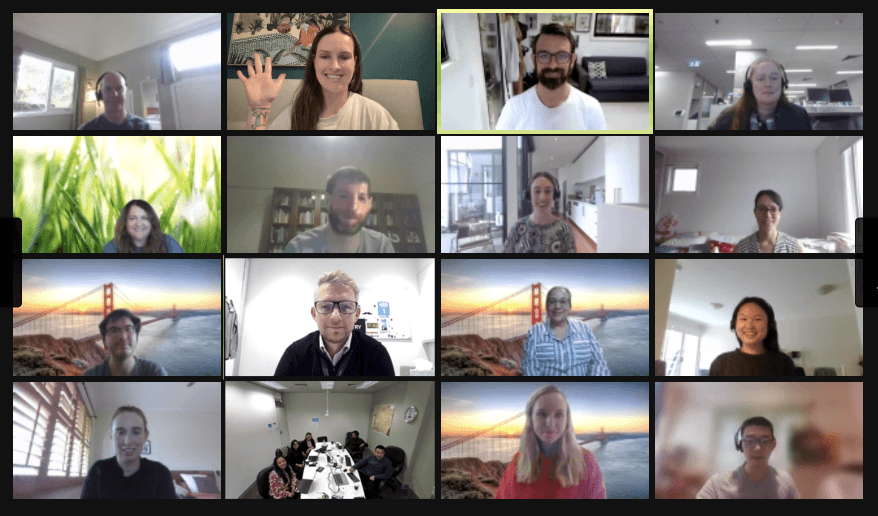Five insights from running digital capability workshops for government teams
27 April 2022
We’ve run our Tech for Non Tech workshops with hundreds of government participants, from local councils to state bodies. We’ve now got a wealth of data that reveals insights, tips and trends that could help improve learning and development within government when it comes to digital capability.
#1 The digital divide is well and truly real, but it’s also not that hard to close the gap
We survey participants across key areas before and after their workshops with us. Pre-workshop results show that most groups have a self-assessed digital confidence level of around 2.3 out of 5. This includes areas like understanding how computers and the internet work, digital ecosystems (how all the bits interact), technical stacks, agile project management, and the ability to have conversations with technical people. This shows there’s a lot of room to grow.

That said, it doesn’t take much to start breaking down the barriers. Our workshop packages usually only span 6 to 9 hours, yet even within that time frame, post-workshop results show huge leaps in confidence and understanding from participants, often even doubling or more in some areas! Imagine what could be achieved with a long-term plan and focus on digital capability.
#2 Non-technical public servants want more than an cursory understanding of tech and digital
Our workshops are designed to give public servants in non-technical roles the essentials they need to feel confident to engage with technical projects or people as part of their work, but feedback shows that they want a much deeper engagement. After every workshop, we always hear that the content was good but that participants want more, more, more! This is great news for organisations as having a more tech-savvy workforce can only be a good thing.
Consider how you can harness this desire, whether it’s through further and more frequent trainings, allowing time for self-led learning or internal mentoring or shadowing opportunities across non-technical and technical roles.
#3 Key themes are security, privacy and communication
Public servants have a pretty good grasp on the basics on computing and the internet but have a lot of questions and confusion around how all the pieces of the tech puzzle fit together and interact with one another. We call this the digital ecosystem. In particular, participants are interested in and least confident when it comes to APIs, the cloud, and the how to make good decisions around tech roles and tools. These are really important topics to have a basic grasp of when considering the number of digital projects and products that gov is building at all levels.

What’s interesting, is participants tend to approach these topics from a risk perspective, with concerns around security and privacy of using such technologies a key focus of discussion. While this is important, by building further confidence in the topic areas above, as well as further training in how to apply a security and privacy lens, public servants can move past their fears and instead focus on how to best utilise what these technologies can offer.
Communication is the other big theme we see across all our workshop groups. Agile is often one the areas people struggle with most and also one where we see the biggest improvement after the workshop. Most Agile training in the market focuses on in-depth and specific “branded” methodologies with their own buzzwords and rules. By bringing it back to the essence of agile, our participants realise that most problems they experience are around communication. Some handy tips and practising techniques to communicate more effectively is often all that’s needed to get folks on the right path.

#4 Our workshops proved how much public servants want to work cross-team within their organisations
This was just one of the meta learnings we gleaned from Tech for Non Tech. Our workshops allow 20 to 30 people across an organisation to do the workshop together, with folks usually cherry picked from a number of different teams or departments. Often, our workshop is the first time these staff members have ever spoken to each other even though they work at the same place.
Through group activities and discussion, these participants have realised the value of collaborating cross-teams, whether it’s revealing commons trends or offering advice after having experiences similar issues within their teams. There’s no reason this cross-team collaboration can’t continue on in the workplace as well.
#5 Workshops and trainings use a variety of interactive methods to engage your staff — so why not use these in your workplace as well?
Our workshops use techniques like online whiteboarding, role playing, live demos, thought experiments, and gamified learning such as creating analogies or pictionary to understand technical concepts. We couple this with real workplace situations, informed by participants, to give teams genuine and practicable insights and ideas by simply approaching the issues they’ve experienced in a different way.
This surely beats just sitting in a room or on a call while someone goes on and on. So why then do we not use this kinds of techniques for every day work as well? Next time, instead sending an email or doing the usual meeting, pose a hypothetical to your team, do a brainstorm, map something out on paper. This will help create a learning culture where business-as-usual and L&D are intertwined and viewed as parts of a whole.
Check out more of our resources
